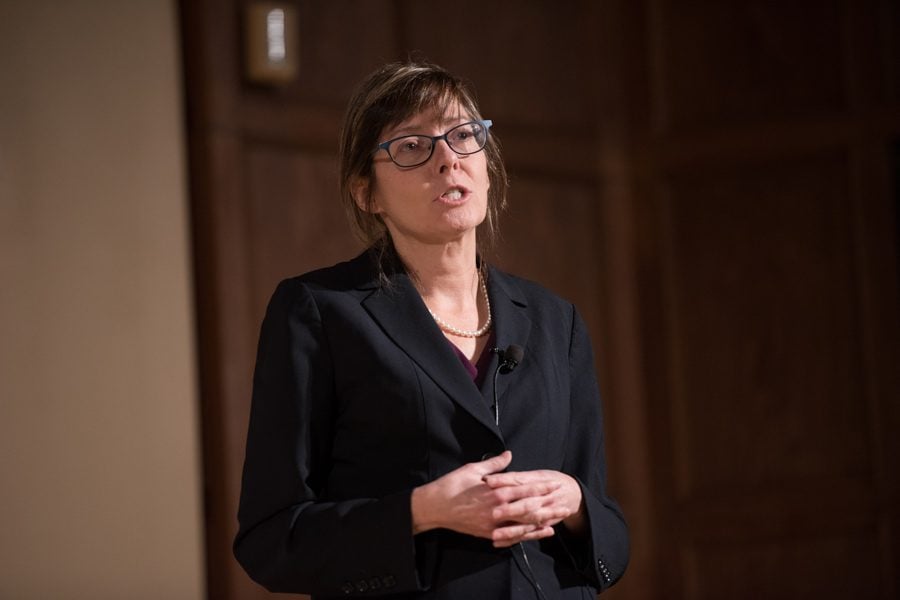Former Feinberg Prof. returns to campus two years after resignation, talks sexuality, academic freedom
Katie Pach/Daily Senior Staffer
Former Feinberg Prof. Alice Dreger. Dreger discusses sexuality and academic freedom at a talk sponsored by Northwestern’s Queer Pride Graduate Student Association. Dreger resigned from NU in 2015.
January 25, 2018
Former NU Prof. Alice Dreger said when the University censored work addressing sexuality, they violated academic freedom and “broke her heart.”
Dreger, a former Feinberg School of Medicine professor, resigned in 2015 after she alleged NU censored the faculty-edited magazine Atrium. Speaking to about 30 attendees on Wednesday, she discussed academic freedom and obstacles in research on sexuality.
As guest editor of Atrium’s Winter 2014 issue, Dreger edited a controversial essay describing the author’s experience of a nurse performing consensual oral sex on him after he was paralyzed at age 18. Digital issues of the magazine were later retracted after NU officials raised concerns about the article. After she said the Feinberg dean’s office failed to address her concerns over censorship, Dreger resigned.
Dreger said the retraction of the magazine points to a larger issue of censorship and academic freedom. Dreger said she feels that administrators worry more about how much money an article will bring in rather than its scholarship.
“If we have the situation where Northwestern medical school’s dean has the right to decide what people are allowed to read, to know and to say,” Dreger said in her talk. “The right … to learn and to go forward is taken from us. It’s severely disappointing.”
At the event, sponsored by Northwestern’s Queer Pride Graduate Student Association, Dreger said she believed administrators retracted the article because it “threatened the brand agreement” between Feinberg and the hospital. She said the censorship placed her in a “disturbing situation,” as it violated academic freedom in conducting scholarly research.
During the Q&A panel, some students said they did not agree with Dreger’s argument against the censorship.
Lauren Herold, a third-year doctoral student in the Department of Radio, Television and Film, said retraction of controversial articles could sometimes avert potential harm to readers.
“Retraction is actually a way for people to say like, ‘This was a mistake. This was a really bad scholarship,’” Herold said. “(It shows) this way of thinking is a probably damaging one.”
In response, Dreger said the retraction deprived authors of the opportunity to express their regrets or publish corrections of previous statements. It also showed that people are “afraid to teach anything that might be controversial.”
While acknowledging potential harm the author might bring to people, Dreger said if administration decides “who can speak,” minority groups may be further marginalized, given that the conversation about LGBTQ people is usually contentious and risky.
“Historically speaking, when people in power come after people, they always end up coming after those that are already marginalized,” Dreger said during the talk.
David Miller, president of QPGSA, said although the organization is interested in talking about marginalized sexual experiences and fighting the norm of heteronormativity, the “inherently controversial nature” of sexuality shares similarities with censorship.
“It’s important for us to be critical of our administration’s actions,” Miller said. “I hope the conversation could lead to one productive dialogue about standing up for robust academic policy in the future.”
Email: LimingWan2021@u.northwestern.edu
Twitter: @piuadrianw


